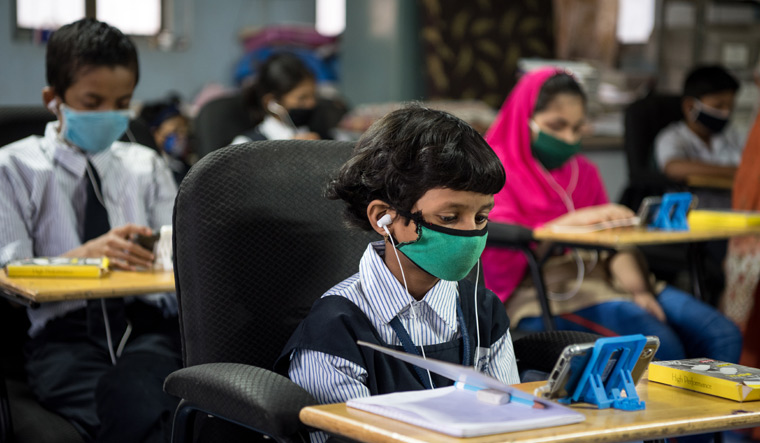The pandemic has wrought unprecedented changes in society. We are in the midst of the greatest change ever in the last 25 to 30 years. During the pandemic, 50 to 60 per cent of the population went online for education, banking, goods and services, entertainment and medical advice. The key thing is, how will things settle down? What percentage of work, for example, will be from home? I think, ultimately, there will be a hybrid model.
There will be greater globalisation because people from different parts of the world will be able to work together; technology allows that. Cheaper and better jobs will shift from developed to developing countries. There will be new business models. Increased outsourcing will mean that several businesses will shrink, with more contract employment companies coming up. With digital signatures and email documentation becoming prevalent, no one will go to banks anymore. Electric vehicles and autonomous cars will become more popular. Holiday homes will come up.
When it comes to education, the pandemic changed the way it is delivered globally. In many places, during the lockdown, people shifted to online education using technology which they had probably never used before. Many children were forced to buy gadgets. The educated and lower middle classes were able to make the shift because they had a smartphone or laptop, or tablet. The poor were left out because they did not have access to the gadgets or the internet.
For those who shifted, the experience has been varied. But the biggest challenge was that face-to-face interaction is essential for schoolchildren. You cannot deprive children of group learning and the camaraderie of their friends for a whole year. We do not want our children to be loners. We all live in a community and must have a community spirit. Many studies have shown that the lack of face-to-face education has affected children adversely. They have lost several skills, including the ability to speak multiple languages and do mathematics.
For the most part, school education, barring a few exceptions, has not been handled well by the state boards. College and university education were handled much better during the pandemic. The All India Council for Technical Education (AICTE) and the University Grants Commission (UGC) rose to the occasion and issued guidelines that in future, 20 to 40 per cent of higher education would be online.
How does one look at the education system in future? It appears that the digital revolution is here to stay. The world has gone digital. Of the 7.8 billion people on the planet, maybe five and a half billion have mobile connections. Five billion people are on the internet. So online education is a reality and will continue to grow. It is essential that we rethink the entire educational process. The government should ensure a good tablet or device for children everywhere to access online education, using multi-language video content. Ninety-seven per cent of India has gone wireless. Online education in schools may be 25 to 35 per cent. Creating an online-offline educational experience for schoolchildren is extremely important and massive investments are called for.
Also read
- India restarts random Covid tests for international passengers as 4 cases of Omicron BF.7 variant detected
- Why are we vilifying Gurnam Singh Chaduni, asks Anuja Chauhan
- The pandemic is rebirthing the world in ways we don’t fully understand yet
- Pandemic might give way to an era of deglobalisation, says Shashi Tharoor
- Overshadowed by pandemic, humanity’s greatest challenges remain: Ashwin Sanghi
- Jerry Pinto's poem: Learning from the lockdown
Many of these changes are envisioned in the New Education Policy 2020. It gives flexibility to students to rejoin their course after dropping out in between. This means that the entire policy will be student-centric. Students will be able to do multiple courses in multiple subjects and collect the credits for a degree. They will be able to take courses from colleges worldwide. All the world will become a platform.
Of course, the physical aspect of education cannot be disregarded. Students should do experiments and work with their hands. But they can also simulate these experiments in a different manner using deep technology. Overall, I envisage the future of education to be very different. Technology can destroy the shackles and limitations of the current education system.
Personally, my education played a great role in making me who I am. I went to a school where the student body reflected societal diversity. There were both rich and poor students; we all grew and studied together. It was not an exclusive school, and it reflected the reality of life. So, when I started working, I could adjust very easily. It is very important to live and study in a real society. That means you have to interact with people from different strata of society, different languages and religions. I was very lucky that way. My mother was a school teacher who made sure there was discipline and that we did our homework and came first in class. I used to read a lot in the library, so I inculcated the reading habit at a young age. Both my sons, too, read a lot.
In college we had a unique experience with teachers who were very liberal. They treated us like friends. They would share with us, come out for a cup of coffee…. We were even allowed to bunk class. We grew up to be rebels of some sort. We were problem solvers with a very strong streak of independence and enormous energy.
I am lucky in many ways. I started my career in 1982 as a chartered accountant, managed a finance company from 1986 to 1994, and then joined Infosys. I was able to witness and participate in the growth of a great company and a great country. Because it was between 1994 and 2020 that India grew at its fastest pace in the last 150 years.
The world that I grew up in is obviously very different from the one in which our children are growing up today. I call the generation that is 25 to 30 years old as the tech generation and the one that is 10 to 15 years old as the Instagram generation, those who were born to technology. The Instagram generation is well informed and confident. They are creative and know how to network. What they need more are human skills—more interaction, play and sports. They require a very different approach in schooling and education. The tech generation is going to be faced with greater competition. There is going to be more uncertainty in their lives with greater disruption of the economy. They are young and change is faster than ever before. And they are going to feel the impact of this change. With machine learning, artificial intelligence and automation, high-quality jobs are going to be scarcer. So they really have to compete, be skilled and work extra hard to succeed in life.
—Mohandas Pai is former CFO, Infosys, Padma Shri awardee, and chairman of Manipal Global Education.
—As told to Anjuly Mathai



